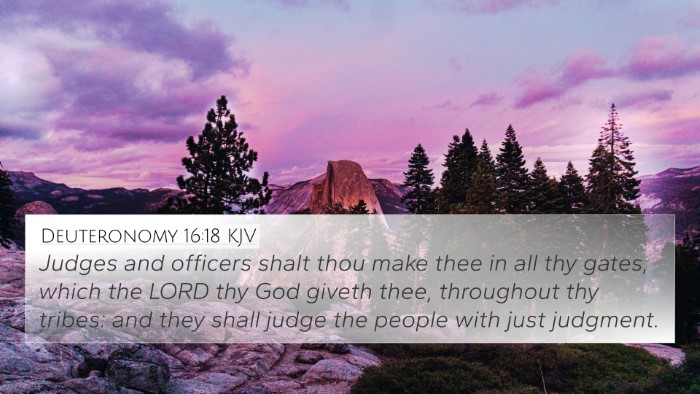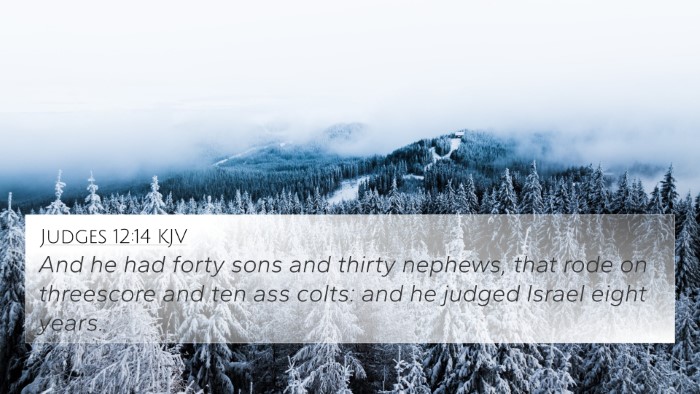Meaning and Interpretation of 1 Samuel 8:1
1 Samuel 8:1 states, "And it came to pass, when Samuel was old, that he made his sons judges over Israel." This verse marks a significant turning point in the governance of Israel, as it introduces the transition from theocratic rule led by judges to a monarchy. The narrative provides an opportunity to explore the underlying themes of leadership, the divine will, and the human desire for political structure.
Contextual Understanding
To fully grasp the implications of this verse, we need to consider the historical and socio-political context. The Israelites had been led by judges during a time of tribal federation, and as Samuel aged, concerns about the continuity of leadership arose.
Summary of Commentaries
Matthew Henry's Commentary
Matthew Henry notes that Samuel, having served faithfully as a judge and prophet, now risks the stability of Israel by appointing his sons in his place. He points out that while Samuel intended to provide a smooth transition, his sons did not possess the integrity or spirit of their father, leading Israel towards a crisis of leadership.
Albert Barnes' Notes
Albert Barnes emphasizes the dissatisfaction that arises amongst the people. As Samuel’s sons corrupt their role as judges, the populace begins to demand a king. Barnes interprets this as a critical moment that reveals humanity's inherent desire for a tangible leader that reflects political norms of surrounding nations, thus initiating a significant divine oversight issue.
Adam Clarke's Commentary
Adam Clarke explains that this verse highlights Samuel’s transition from individual leadership to a familial hereditary system, which contradicts the principles of divine appointment. He remarks on how this moment foreshadows the eventual downfall that monarchy would lead to, thus portraying the struggles between divine intent and human choices.
Thematic Connections
This scriptural passage can be linked to various biblical themes, including:
- Leadership and Authority: The transition from judges to kings demonstrates a shift in the understanding of authority within Israel.
- Human Fallibility: The failure of Samuel’s sons serves as a reminder of human corruption and the need for divine oversight.
- Desire for Conformity: The desire of Israel to have a king reflects their longing to conform to worldly standards rather than divine mandates.
Bible Verse Cross-References
Several other verses can be cross-referenced to enrich understanding:
- Deuteronomy 17:14-20: Discusses regulations for kings.
- 1 Samuel 12:12-13: The people’s demand for a king is addressed.
- 1 Samuel 10:19: Israelites reject God as their king.
- 1 Samuel 16:1: God's anointing of Saul as king.
- 1 Samuel 15:23: Saul's rejection due to disobedience.
- 2 Samuel 8:15: David's governance contrasted with Saul's.
- Hosea 13:11: God’s judgment on Israel for desiring a king.
Inter-Biblical Dialogue
This verse initiates a dialogue through scripture that spans both the Old Testament and New Testament. The desire for a king signifies a critical juncture in the relationship between God and His people, reflecting deeper themes found in other biblical texts:
- Kingdom of God: The parallel with Jesus' kingship in the New Testament.
- Spiritual Leadership: Contrast with the leadership style of Jesus as the ultimate leader.
Conclusion
1 Samuel 8:1 serves not only as a historical narrative but as an essential point of reflection on the nature of leadership, the divine-human relationship, and the tensions between spiritual and political realms. By utilizing tools for Bible cross-referencing, believers can engage in a deeper study that evaluates the connections between this verse and the broader narrative of scripture.
Further Study Suggestions
For those interested in exploring deeper themes:
- Utilize a bible concordance to locate related verses.
- Engage in cross-reference Bible study methods to uncover connections.
- Consider modern interpretations of the monarchy in Israel and its implications for today.










